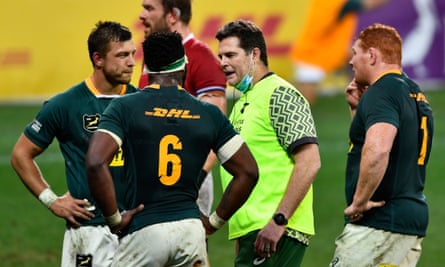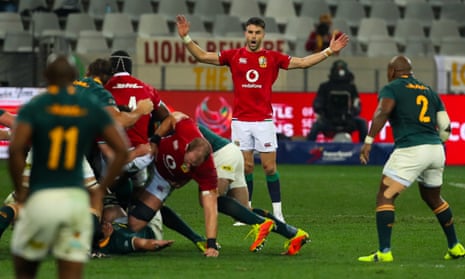It is Saturday evening in Cape Town Stadium and up goes the final restart. There is no audible roar around the empty arena, just an inner screech of locked-in tension. The scores are tied and, entering the last minute of a hugely controversial series, the outcome remains unclear. As the ball descends and the Springbok forwards surge towards the waiting Lions receiver, 12 years of intense anticipation have come down to this.
At which point let’s press the pause button. Imagine the would-be catcher is the Lions and Wales hooker Ken Owens. Put yourself in his position. In 2017 it was the “accidental” offside call against “The Sheriff” at a similar juncture of the tied All Blacks series that shaped the whole outcome. By the letter of the law the referee Romain Poite should have awarded a penalty, only for the Lions captain Sam Warburton to ask for the decision to be referred upstairs. A scrum was the result. Was justice served? The answer, even now, mostly depends on the part of the world from which you hail.
Now let’s imagine a similar scenario happening again. Owens fumbles the ball and one of his teammates – let’s say Maro Itoje – inadvertently grabs the rebound for a split second whilst standing in an offside position. The referee Mathieu Raynal – another Frenchman – has a decision to make and an unavoidable precedent. Already, though, he can hear Alun Wyn Jones calling out “Monsieur” and can sense a certain Springbok waterboy sprinting towards him. Up in the stands the television match official is clutching his head in his hands. How on earth did it come to this?
We do not yet know, of course, how the final reel of this particular Hammer horror show will play out. But all concerned already know – with a nagging sense of dread – that liberal helpings of sod’s law appear to feature in the tour agreement. The highest profile series of all minus any expansive rugby? Tick. Referee-influencing shithousery on an unprecedented scale? Tick. Open season on rugby’s reputation, integrity and values? Tick. Tick. Tick.
Part of the whole appeal of elite sport, clearly, is the element of jeopardy. Not knowing what is going happen next is the beauty of it. But maybe now is the moment, with this sulphurous-fumed series still undecided, to put a foot on the ball, suspend partisan loyalties and ask whether it has to be like this. Could the supposed holy grail really exist? A major tour or tournament where the players live in less fear of officiating confusion, where clarity rules OK and where a monumental refereeing row does not pollute the entire narrative?
It may be too late to heal all the unsightly sores opened up on this tour but, hopefully, World Rugby will have realised enough is enough. Matches have become ridiculously stop-start and cynical gamesmanship is increasingly rife, on and off the field. The world’s governing body have taken their time issuing a strong statement but, whatever happens, these are three immediate tweaks they can make.
The first is to instruct the TMO to butt out and leave virtually all in-game decisions to the on-field officials, save for the option of reviewing forward passes, feet in touch or players potentially in front of the kicker prior to a try being scored. If a grounding beneath a heap of bodies looks likely on the balance of probabilities, award it, as happens at every other level of the sport. If not, move on.

Next up, foul play. Again, if it is clear and obvious let the officials decide. If they are unsure or unsighted stick the player on report – as in rugby league – and pore over the replays afterwards. Added to the list can be players who feign injury, gesticulate at the touch judge or pat an opponent condescendingly on the head when a mistake is made. Charges of unsportsmanlike behaviour should also be possible if a coach or director of rugby posts self-serving, referee-knocking clips on social media.
Third is the banning of all headsets on the field, aside from the referee’s microphone, and allowing only one waterboy per team. If anyone else wants a drink they must go to the sideline or await the next break in play. If there are injuries, the game will not stop unless there is a potentially serious head injury or a player in obvious distress.
Slowly but surely, in other words, rugby needs to be pulled from the mire of stoppages and red tape into which it has descended. And then what? Miraculously, the pace of the game will pick up again, with fatigue becoming more of a factor. Players who bellyache or whinge on the field will have to shut up or risk a sanction. Coaches who micro-manage their teams will only be able to do so during the week. Technology will continue to play an important role but more as an educational aid than as a tool to sway officials during a game.
And, who knows. Maybe rugby could yet be dragged back from the edge of the abyss upon which it currently hangs. Maybe older fans will feel like reconnecting with the irresistible spirit which attracted them to the game in the first place. Younger audiences will be struck by a competitive valour and sportsmanship few other sports can match. And just maybe, when Owens stands beneath his next series-defining high ball, there will be a greater chance of a happier, less divisive ending for all.
And finally …
This is the final Breakdown column of a uniquely long rugby union season, stretching all the way back to last August when the Covid-interrupted 2019-20 Premiership campaign resumed. It’s time for a short break. On behalf of everyone at Guardian Sport, many thanks to all our subscribers and see you again in a few weeks’ time.

Comments (…)
Sign in or create your Guardian account to join the discussion